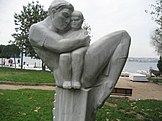From today's featured article
Velociraptor is a genus of small dinosaurs that lived in Asia during the Late Cretaceous epoch. It was about 1.5 to 2.07 m (4.9 to 6.8 ft) long with a body mass around 14.1 to 19.7 kg (31 to 43 lb). Velociraptor was a bipedal carnivore with feathers, a long tail, and an enlarged sickle-shaped claw on each hindfoot; these claws are thought to have been used to tackle and restrain prey. It is distinguished from other dromaeosaurids by its long and low skull, with an upturned snout. One of the dinosaur genera most familiar to the general public (due to its prominent role in the Jurassic Park films), in actuality it was roughly the size of a turkey, considerably smaller than its depictions in novels and films. It is well known to paleontologists, with more than a dozen described fossil skeletons. One dramatic specimen preserves a Velociraptor locked in combat with a Protoceratops. (Full article...)
Did you know ...
- ... that the box cover of the board game John Company shows Georgiana, Duchess of Devonshire, and George, Prince of Wales, gambling at hazard (pictured)?
- ... that Premana Premadi is the first Indonesian female astronomer to have an asteroid named in her honor?
- ... that the album No Highs is a response to the "corporate" ambient music of streaming services?
- ... that telephone operator Myriel Davies began her long career as a peace activist during the Suez Crisis?
- ... that New Zealand's Native Island hosted a colony of Samoyeds and huskies used in both the Southern Cross and Nimrod expeditions to the South Pole?
- ... that the suspect in a deadly shooting at the University of North Carolina was a graduate student of the victim?
- ... that the sound for the film A Rustling of Leaves: Inside the Philippine Revolution was recorded using a Walkman?
- ... that a man from Milwaukee who goes on walks shirtless is known as the "Milverine"?
In the news
- In motorsport, Kalle Rovanperä (pictured) and Jonne Halttunen win the World Rally Championship.
- A mine fire in Karaganda Region, Kazakhstan, kills 42 people.
- Hurricane Otis makes landfall near Acapulco, Mexico, leaving at least 39 people dead.
- In the United States, 18 people are killed in a mass shooting in Lewiston, Maine.
On this day
- 1938 – CBS Radio broadcast the radio drama The War of the Worlds, causing panic among some listeners who believed that an actual Martian invasion was in progress.
- 1948 – A luzzu fishing boat overloaded with passengers capsized and sank in the Gozo Channel off Qala, Gozo, Malta, killing 23 of the 27 people on board (monument pictured).
- 1991 – The Madrid Conference, an attempt by the international community to revive the Israeli–Palestinian peace process through negotiations, convened.
- 1993 – The Troubles: Three members of the Ulster Defence Association opened fire in a crowded pub during a Halloween party, killing eight people and wounding nineteen others.
- 2002 – Warren Zevon made his last public appearance on the Late Show with David Letterman, giving the advice to "enjoy every sandwich".
- Miloš Trifunović (b. 1871)
- Dave Gallaher (b. 1873)
- Gustav Ludwig Hertz (d. 1975)
- Jam Master Jay (d. 2002)
From today's featured list
Twenty sculptures were erected in Istanbul in 1973 and 1974 to commemorate the fiftieth anniversary of the establishment of Republic of Turkey on 29 October 1973. The theme of the sculptures was open; the sculptors were not only allowed but encouraged to freely express their own characteristic styles. This was a unique event in the history of modern Turkish sculpture, which had until then mostly only seen commissions for monuments. The Istanbul Municipality intended to erect fifty sculptures, but a lack of funds necessitated that the number of sculptures be reduced to twenty. Only six of the sculptures remain, four of which remain in their original location. (Full list...)
Today's featured picture

|
Fumarole minerals are minerals that are deposited by fumarole exhalations. They form when gases and compounds desublimate or precipitate out of condensates, forming mineral deposits. They are mostly associated with volcanoes (as volcanic sublimate or fumarolic sublimate), following deposition from volcanic gas during an eruption or discharge from a volcanic vent or fumarole, but have been encountered on burning coal deposits as well. They can be black or multicoloured and are often unstable upon exposure to the atmosphere. This fumarole formation, formed of acicular crystals of tazieffite (black), was sampled at Mutnovsky, a volcano on the Kamchatka Peninsula in Russia. The image was taken by scanning electron microscope. Photograph credit: Ppm61
Recently featured:
|
Other areas of Wikipedia
- Community portal – The central hub for editors, with resources, links, tasks, and announcements.
- Village pump – Forum for discussions about Wikipedia itself, including policies and technical issues.
- Site news – Sources of news about Wikipedia and the broader Wikimedia movement.
- Teahouse – Ask basic questions about using or editing Wikipedia.
- Help desk – Ask questions about using or editing Wikipedia.
- Reference desk – Ask research questions about encyclopedic topics.
- Content portals – A unique way to navigate the encyclopedia.
Wikipedia's sister projects
Wikipedia is written by volunteer editors and hosted by the Wikimedia Foundation, a non-profit organization that also hosts a range of other volunteer projects:
-
Commons
Free media repository -
MediaWiki
Wiki software development -
Meta-Wiki
Wikimedia project coordination -
Wikibooks
Free textbooks and manuals -
Wikidata
Free knowledge base -
Wikinews
Free-content news -
Wikiquote
Collection of quotations -
Wikisource
Free-content library -
Wikispecies
Directory of species -
Wikiversity
Free learning tools -
Wikivoyage
Free travel guide -
Wiktionary
Dictionary and thesaurus
Wikipedia languages
This Wikipedia is written in English. Many other Wikipedias are available; some of the largest are listed below.
-
1,000,000+ articles
-
250,000+ articles
-
50,000+ articles




